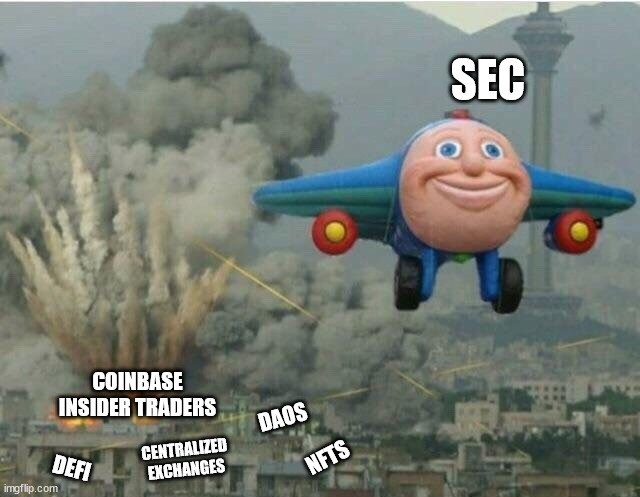Three Arrows Capital Is Sorry (Maybe)

Dear Bankless nation,
Here’s a recap of the biggest crypto news in the last week of July.
Three Arrows Capital founders break silence
The founders of 3AC broke their silence this week in a widely publicized Bloomberg piece. The article doesn’t shed light on any new salient information, but is noteworthy because it’s the first we’re hearing from the co-captains that steered a gargantuan financial catastrophe. Here’s a summary of reasons Zhu and Davies gave for 3AC’s downfall in the interview:
- They got too close to Do Kwon and overestimated LUNA’s potential
- They traded Grayscale BTC successfully “at the right window” but because many crypto firms “copied us into that trade… then the trust went… to a far bigger discount than anyone thought possible.”
- Bitcoin went from 30K to 20K and that was “extremely painful for us”
- “We had different types of trades that we all thought were good, and other people also had these trades,” Zhu said. “And then they kind of all got super marked down, super fast.”
In short, we made risky trades that went south but it’s not all on us, because, well, everyone else did them too, and we couldn’t have foreseen that Bitcoin crash, so we got caught with our pants down by systemic risk. Well, okay. It’s true that no one can see the future. That’s exactly why an entire industry exists around risk management. They’re called hedging and diversification and every modern financial institution uses them except for 3AC which utterly failed to take them seriously.
And then something that sounded… nothing like an apology:
“People may call us stupid. They may call us stupid or delusional. And, I’ll accept that. Maybe,” Zhu said. “But they’re gonna, you know, say that I absconded funds during the last period, where I actually put more of my personal money back in. That’s not true.”
“The whole situation is regrettable,” Davies said. “Many people lost a lot of money.” “We believed in everything to the fullest,” added Davies. “We had all of our, almost all of our assets in there. And then in the good times we did the best. And then in the bad times we lost the most.”
And then there’s this attempt at signaling humility:
The [$50 million yacht] “was bought over a year ago and commissioned to be built and to be used in Europe,” Zhu said, adding the yacht “has a full money trail.” He rejected the perception that he enjoyed an extravagant lifestyle, noting that he biked to work and back every day and that his family “only has two homes in Singapore.” “We were never seen in any clubs spending lots of money. We were never seen, you know, kind of driving Ferraris and Lamborghinis around,” Zhu said.

By the way, I live in Singapore. The average cost of a car is ~150K USD which explains why the mass majority of Singaporeans commute to work by public transportation. If you’re biking to work, you probably live in the wealthiest estates of the city-state, and we already know that one of Zhu’s home was a 31,000-square-foot home worth $35M. So whatever two humble abodes Zhu was hopping in between, they were more like palaces relative to the average person.
Coinbase insider trading
The big story this week revolves around Coinbase. Here are the quick facts:
- Between June 2021-April 2022, former Coinbase product manager Ishan Wahi who worked on the assets listing team tipped off two others - his brother and a friend - about 25 to-be listed coins and collectively raked in profits of up to $1.5M.
- Some early signs emerged in mid-April when Cobie tweeted about a wallet that scooped up 100K+ worth of tokens 24 hours before it was published on the Coinbase Asset listing post.
- The US DOJ is charging the trio with “wire fraud conspiracy… in connection with a scheme to commit insider trading in cryptocurrency assets by using confidential Coinbase information”, and calling it "the first ever insider trading case involving cryptocurrency markets."
Story so far: TradFi insiders making money from insider deals. Nothing out of the ordinary yet, we know that TradFi bad, blockchain good.
But that’s not quite the drama at hand here. The SEC continued to separately file charges of “securities fraud” against the insider traders, alleging that nine of the traded assets listed by Coinbase were unregistered securities (AMP, DDX, DFX, KROM, LCX, POWR, RGT, RLY, XYO). As a result, Coinbase is taking a hit as its stocks are down 21% and Cathie Wood of Ark Invest is reportedly dumping 1.41M Coinbase shares.
To no one’s surprise, Coinbase and the broader crypto community isn’t happy. CFTC Commissioner Caroline Pham is calling this a “striking example of regulation by enforcement” or what is sometimes referred to as “rule by law”, a pejorative term to label state authoritarianism.
The crux of the matter is this: The SEC’s charges contain a loaded premise, namely that these handful of Coinbase-listed tokens are indeed securities. Should the insider traders be convicted, it indirectly puts Coinbase and those token-issuers on trial for violating U.S. securities law.
But even if the charges get dropped eventually, the accusation in itself is damning. It kicks up a fog of regulatory uncertainty for dozens of crypto exchanges that are listing the same tokens, as well as token-issuers broadly. This happened when the SEC brought an enforcement action against Ripple (XRP) back in 2020, and it’s happening again now.

Ironically, Coinbase is most conservative in its token listings relative to its main competitors Binance and FTX. (If CZ or SBF reads this humble newsletter, please don’t let any insider traders screw this up.)
But look, Coinbase is a regulated public company operating obediently within the confines of the official rulebook. If regulators have problems with Coinbase who plays nice and is rule-observing, decentralized exchanges that allow any token listing should be quaking in their boots.
Asides from that, crypto being pigeonholed as a tradable security under U.S. securities law would mean being tangled up in the same TradFi regulatory apparatus. That means fines, regulatory burdens, and heightened entry barriers for new players. That’s bad for crypto innovation and goes against the fundamental permissionless ethos of the Web3 project.
More interesting but hard to settle is the normative question of whether digital assets should be considered securities. The U.S. traditionally determines whether something is a “security” based on the Howey test, where the criteria is an investment contract that includes an “investment of money in a common enterprise with a reasonable expectation of profits to be derived from the efforts of others”. Asides from a profit motive, regulators also look to the extent of its centralization i.e., whether the token has an active managerial team behind it.
Which tokens would fit both those criteria? Does that exclude L1/L2 tokens like ETH or OP that function as a commodity (gas) to power an ecosystem? How about tokens like DYDX after they migrate to their own Cosmos chain - would that turn the DYDX token into a non-security? What about “reserve currency” tokens like OHM - are they a “store-of-value” asset like gold/Bitcoin, making them a non-security? Let’s not forget NFTs. Most buyers mint them with an expectation of a profit, but does that make it a security?
It’s all very fuzzy. I’ve written in a previous newsletter about why this debate amounts to a lot of arbitrary semantics.
Web3 News Roundup
Uniswap
Uniswap fees are through the roof this week, with a higher 7 day average than the Ethereum, BNB Chain and Bitcoin networks put together 🤯
At present, Uniswap the DAO does not make any profits as all revenues go to liquidity providers (for more on which DeFi protocols are profitable, see Ben’s article this week). This is part of Uniswap's strategy to maintain a competitive advantage, until it turns on the so-called “fee-switch” that would let the DAO earn by redirecting fees from liquidity providers.
Recent Uniswap governance discussions show the Uniswap community taking its first steps towards flipping on the fee-switch on pools with deep liquidity, relatively high volume and least potential of impermanent loss.
Goerli testnet
The Goerli testnet, the final testnet before the Merge has been announced by Ethereum developers on August 6-12th.
Bankless will be livestreaming this one!
Other news:
The WNBA is using POAPs; Solana has physical stores; Mirror is launching Web3 subscriptions, which lets users subscribe to publications with their wallets; WalletConnect introduces a DM feature connecting users on any chain; Rainbow rolled out support for L2 NFTs; Optimism launches a Get Started onboarding quest.
Here’s what we have lined up next week.
- We’re gearing up for Merge month! David’s writing everything you need to know about the Merge
- William is dropping a stable yield tactics on Velodrome
- Hasu is joining us on the podcast!
See you next week.
- Donovan